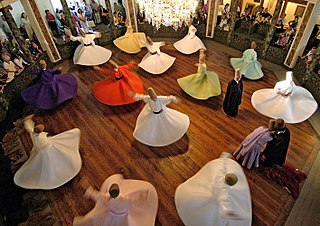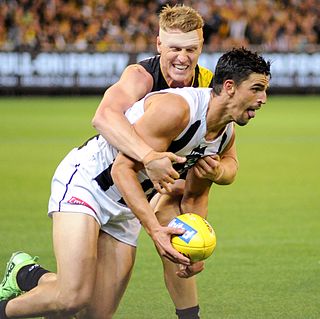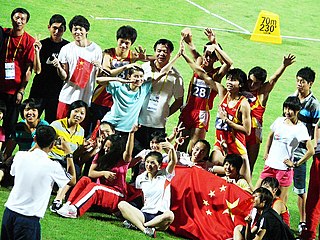
The National Collegiate Athletic Association (NCAA) is a nonprofit organization that regulates student athletics among about 1,100 schools in the United States, and one in Canada. It also organizes the athletic programs of colleges and helps over 500,000 college student athletes who compete annually in college sports. The organization is headquartered in Indianapolis, Indiana.

Sama is a Sufi ceremony performed as part of the meditation and prayer practice dhikr. Sama means "listening", while dhikr means "remembrance". These performances often include singing, playing instruments, dancing, recitation of poetry and prayers, wearing symbolic attire, and other rituals. Sama is a particularly popular form of worship in Sufism.

Sportsmanship is an aspiration or ethos that a sport or activity will be enjoyed for its own sake, and with proper consideration for fairness, ethics, respect, and a sense of fellowship with one's competitors. A "sore loser" refers to one who does not take defeat well, whereas a "good sport" means being a "good winner" as well as being a "good loser".

Emmanuel Dapidran Pacquiao is a Filipino politician and former professional boxer. Nicknamed "PacMan", he is widely regarded as one of the greatest professional boxers of all time. He previously served as a senator of the Philippines from 2016 to 2022.
Filipino psychology, or Sikolohiyang Pilipino, in Filipino, is defined as the philosophical school and psychology rooted on the experience, ideas, and cultural orientation of the Filipinos. It was formalized in 1975 by the Pambansang Samahan sa Sikolohiyang Pilipino under the leadership of Virgilio Enriquez, who is regarded by many as the father of Filipino Psychology. Sikolohiyang Pilipino movement is a movement that created to address the colonial background in psychology in the country. It focuses on various themes such as identity and national consciousness, social awareness, and involvement, and it uses indigenous psychology to apply to various fields such as religion, mass media, and health.

A contact sport is any sport where physical contact between competitors, or their environment, is an integral part of the game. For example, gridiron football. Contact may come about as the result of intentional or incidental actions by the players in the course of play. This is in contrast to noncontact sports where players often have no opportunity to make contact with each other and the laws of the game may expressly forbid contact. In contact sports some forms of contact are encouraged as a critical aspect of the game such as tackling, while others are incidental such as when shielding the ball or contesting an aerial challenge. As the types of contact between players is not equal between all sports they define the types of contact that is deemed acceptable and fall within the laws of the game, while outlawing other types of physical contact that might be considered expressly dangerous or risky such as a high tackle or spear tackle, or against the spirit of the game such as striking below the belt or other unsportsmanlike conduct. Where there is a limit as to how much contact is acceptable most sports have a mechanism to call a foul by the referee, umpire or similar official when an offence is deemed to have occurred.

Sports in the Philippines is an important part of the country's culture. There are six major sports in the Philippines: basketball, boxing, tennis, football, billiards, and volleyball.

Manuel Velez Pangilinan,, also known as Manny Pangilinan or sometimes by his initials MVP, is a Filipino businessman and sports patron. He is the managing director and CEO of First Pacific Company Limited, a Hong Kong-based investment management and holding company with operations in the Asia-Pacific region. Pangilinan is also the First Pacific's chairman for the group's investments in the Philippines, such as the Metro Pacific Investments Corporation, PLDT, and Philex Mining Corporation. He is the chairman Emeritus of the Samahang Basketbol ng Pilipinas (SBP) and was its first president, having served two consecutive terms from 2007 to 2018.
A sports chaplain provides pastoral care for the sports community, including athletes, coaches, administrators and their families. In 2017, a Global Summit of Sports Chaplaincy ministries defined sports chaplaincy as “ongoing pastoral and spiritual care, by permission, to those of faith or no faith, for the holistic well-being of all involved in the community of sport.” Different sports and cultures may adopt the practice of sports chaplaincy but under different titles, such as sports mMentor, life coach or character coach. Consequently, the practical outworking of sports chaplaincy in wide in scope, but broadly fits into 5 models of delivery and is primarily a relational approach.
In Philippine culture, loob or kalooban refers to one's inner self, or, more specifically, to the internal dimension of a person's identity. Its external counterpart is labas - the physical, outward appearance. Loob is a core concept in Filipino Psychology, a field which is unthinkable without both the internal and external dimensions, "loob"/"labas".
Utang na loob is a Filipino cultural trait which, when translated literally, means "a debt of one's inner self (loob)."

Sport pertains to any form of physical activity or game, often competitive and organized, that aims to use, maintain, or improve physical ability and skills while providing enjoyment to participants and, in some cases, entertainment to spectators. Sports can, through casual or organized participation, improve participants' physical health. Hundreds of sports exist, from those between single contestants, through to those with hundreds of simultaneous participants, either in teams or competing as individuals. In certain sports such as racing, many contestants may compete, simultaneously or consecutively, with one winner; in others, the contest is between two sides, each attempting to exceed the other. Some sports allow a "tie" or "draw", in which there is no single winner; others provide tie-breaking methods to ensure one winner. A number of contests may be arranged in a tournament producing a champion. Many sports leagues make an annual champion by arranging games in a regular sports season, followed in some cases by playoffs.
Filipino values are social constructs within Filipino culture which define that which is socially considered to be desirable. The Filipino value system describes "the commonly shared and traditionally established system of values underlying Filipino behavior" within the context of the larger Filipino cultural system. These relate to the unique assemblage of consistent ideologies, moral codes, ethical practices, etiquette and personal and cultural values that are promoted by Filipino society.
Athletics is a term encompassing the human competitive sports and games requiring physical skill, and the systems of training that prepare athletes for competitive performance. Athletic sports or contests are competitions which are primarily based on human physical competition, demanding the qualities of stamina, fitness, and skill. Athletic sports form the bulk of popular sporting activities, with other major forms including motorsports, precision sports, extreme sports and animal sports.

Youth sports is any sports event where competitors are younger than adult age, whether children or adolescents. Youth sports includes school sports at primary and secondary level, as well as sports played outside the education system, whether informally or organized.
Sport for social development is a method of bringing about social change through the use of sports. In the United States this is commonly referred to as sports-based youth development. Sport refers to the physical activity and development in any individual, health, social and economic benefits. Sport is used as a tool for peace and development. The programs use sport to help children learn lifelong skills as an incentive for the children to improve their scholarship. Sport is used as a tool to reach personal and community goals. Most organizations utilizing this method are geared towards underprivileged children and teenagers in urban areas.
Fan loyalty is the loyalty felt and expressed by a fan towards the object of his/her fanaticism. Fan Loyalty is often used in the context of sports and the support of a specific team or institution. Fan loyalties can range from a passive support to radical allegiance and expressions of loyalty can take shape in many forms and be displayed across varying platforms. Fan loyalty can be threatened by team actions. The loyalties of sports fans in particular have been studied by psychologists, who have determined several factors that help to create such loyalties.
Sports in Somaliland are popular from both the participation and spectating aspect. Some popular sports in Somaliland are football, track and field and basketball. Among all sportin Somaliland, the most popular one is football. Sporting events in Somaliland are organised by the Somaliland's Ministry of Youth and Sports. Somaliland hosts the Somaliland Regional Games, a multi-sport event every two or four years. The participants of this event are the athletes from all regions of Somaliland.
"Walang utang na loob" is a Filipino expression used to describe ungratefulness or the act of disregarding a "debt of gratitude". It is related to the Filipino cultural trait utang na loob, which literally means "debt of one's inner self (loob)" and is often translated to "debt of gratitude".
Pakikisama is an abstract psychological concept in Filipino culture that is considered a key value of Filipino society. Pakikisama is translated literally to “get along with,” or to “to go along with” other people. Additionally, the concept of pakikisama is often interpreted as having an interpersonal relationship where people are friendly with each other. It has also been described as "making the other feel welcome, safe, and nurtured". The word itself connotes a willingness to yield to the decision of the majority so as to have a unanimous decision amongst the members of the group.








